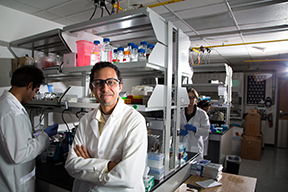For UH chemical engineer Navin Varadarajan, it isn’t enough to conduct laboratory research, publish papers, earn grants and win awards for his work in immunotherapy, which utilizes the body’s own immune cells to attack tumors. Varadarajan says he yearns for something more – a connection to the people who he hopes will eventually benefit from his work in the Single Cell Laboratory at the UH Cullen College of Engineering.
“When you’re working with cells, it’s just like any experiment, but when you can connect the cells you’re studying to a patient, it changes everything,” said Varadarajan, who had a life-changing experience while conducting HIV research with collaborators at MIT in 2009.
“While I was collaboration with clinicians in Boston we were able to connect the patients whose cells we were studying in the lab with the experiments. It really had that, “Wow!” effect on me.” Since then Varadarajan said he couldn’t disassociate the cells he studies in the lab from the people they came from. “It’s made me a better researcher, a better engineer.”
Perhaps that’s what caught the attention of the Department of Defense Peer Reviewed Cancer Research Program, who awarded Varadarajan a Career Development Award for his pioneering work in immunotherapy for treatment of melanoma.
The award supports researchers who are still early in their careers and pairs them with cancer researchers with advanced experience in the field.
A powerful pair
Varadarajan chose MD Anderson Cancer Center’s Patrick Hwu, a prominent tumor immunologist who researches adoptive T cell therapies, as his research mentor. It’s a powerful pairing by any measure: Varadarajan brings to the table a novel research platform that will allow the duo to study interactions between single T cells and cancer cells, while Hwu brings decades of expertise on CAR T cell therapy, a method of engineering T cells to seek and kill cancer cells.
Varadarajan and Harjeet Singh of MD Anderson Cancer Center propose to study single cell interactions between tumor cells and T cells, the body’s cancer-killing immune cells, to monitor metabolic changes in the cells over time. Varadarajan will receive up to $360,000 over three years to complete the research.
For Varadarajan, the opportunity to work with one of the world’s most renowned cancer immunologists is a reward in of itself. So when Hwu suggested that he shadow him in the clinic when he sees patients, Varadarajan could hardly contain his excitement.
“Oh, my gosh. It’s a really big deal!” he said, adding that the opportunity will allow him to scratch a longtime itch. “As a researcher I don’t get to interact with patients otherwise ever. I’ve always had an inclination to understand the clinical aspects of immunotherapy. It adds a human element to it.”
The final battle
Immunotherapy is currently effective in only 20 percent of cancer patients. Researchers know that not all immune cells are created equal – some T cells are much better at killing off cancer cells than others.
Much like people, cells need nutrients to survive. The environment inside of a tumor cell is not nutrient-rich, so T cells must fight for available resources in addition to battling the cancer cells. Oftentimes the immune cells die from lack of nutrients before the battle with the cancer cells even begins.
“What qualities must a T cell have in order for them to be excellent killers of tumor cells? If we know these characteristics we can engineer immune cells to survive and fight the cancer cells,” said Varadarajan.
Varadarajan’s lab will implement a genetically-encoded sensor made of proteins that will sit inside of the T cell and collect information on the metabolic state of the immune cell over time.
“We want to understand the metabolic changes that took place that allowed the T cell to persist and kill the cancer cell,” said Varadarajan. “This should bring us one step closer to manufacturing cancer-killing cells for melanoma and other cancers.”
